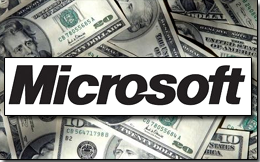Microsoft Wants 5% Cut of Each New Windows PC
It's the Microsoft tax.
Microsoft has historically been rather hush hush when it comes to it's share in the sale of a new PC that includes an OEM copy of Windows, but one general manager of Corporate Strategy at Microsoft revealed some interesting figures.
While none of this information is official, and we're sure that Windows licensing costs vary from one OEM to the next depending on negotiate deals, it seems that Microsoft takes about $50 per PC that costs around $1000.
"If you think of the $1,000 PC, which has kind of been the benchmark for the last decade or so, then we've always charged about $50 for the copy of Windows for that PC," Songhurst revealed at the Jefferies Annual Technology Conference, as reported by Ars Technica.
"So that's five percent. So if you think about charging $100, $200 or if you think about a super high-end PC, you know the Sony Vaios or anything that's there for around the $1000 mark, or the Alienware PCs that are even higher, if we can get that constant percentage then we should be indifferent to the number five points in the market," Songhurst continued.
Clearly, taking a $50 cut from a $300 netbook is something that most OEMs would probably find to be disadvantageous, which would make one think that alternative operating systems such as Ubuntu would have the upper hand. But Microsoft seems to think that it would be happy if it could score five percent from every new PC sale, particularly with the increased range of PC prices with the advent of netbooks and $300 laptops at Wal-Mart.
Get Tom's Hardware's best news and in-depth reviews, straight to your inbox.
-
cadder 5% seems like it would be in the consumer's favor. And why do they charge so much for the retail versions of the OS? I figure the average home PC is probably closer to $500 than $1000, so if they receive $25 for the license for the OS on that machine, why do they charge $100 or more at retail for the same thing?Reply
I'm sure they have figured this out better than we have, but it seems like they would prefer a sliding scale with higher than 5% for the low end computers and less than 5% for the upper end computers.
How many computers are sold to business users for significantly higher than $1000? Maybe there are enough of these sold that they want their 5% of the higher prices. -
pharge hmmm... I am confused... Shouldn't MS charged the OEM based on the version of OS installed not on the price of the computer?Reply
Since most of the computers (desktop or laptop... except netbooks) have Vista home/enterprice installed... will these percentage still 5%? or this is just the average? -
ethanolson They're exactly opposite of Apple. The MS OS costs less when bundled with the hardware but more on the shelves. Apple is the other way around where you're paying a ton for the OS because of the controlled hardware for it... but it's cheaper than MS Windows if you buy it on the shelf.Reply -
bustapr Since pc manufacturers aren't going to like this, I imagine this would make for a good moment for pc manufacturers to consider linux. It'll be way cheaper and they wouldn't have to worry about warranty issues, since most pcs are sent back due to virus crashes. They'll save a lot of money.Reply -
ethanolson I work for HP and the price is different based on the version. His 5% number sounds like it's 90% home editions... leading me to believe he commented with retail stats.Reply
I know that MS gets about $15-25 per XP Home on a netbook... which is a little more than 5%, but they get more for their business/pro editions. -
thackstonns bustaprSince pc manufacturers aren't going to like this, I imagine this would make for a good moment for pc manufacturers to consider linux. It'll be way cheaper and they wouldn't have to worry about warranty issues, since most pcs are sent back due to virus crashes. They'll save a lot of money.Reply
except then alot of people would be using Linux and everyone would start writing virus's for it. Of course then Microsoft could claim its secure. I hate it when people go oh well linux is secure, oh well apple is secure. Yep they are cause no one is going to try to steal information 2% of the computer market. They are going to focus on the other 98%. -
jellico Well, 5% on the cost of a computer for an OEM computer of the operating system seems pretty reasonable. It costs me a lot more when I buy an OEM copy from Newegg when I put together a new system. Unfortunately, I doubt small-scale retail system builders can get an OEM distribution license.Reply -
domenic bustaprSince pc manufacturers aren't going to like this,....Reply
Why are pc manufacturers not going to like this? Do you think they expect to get windows for free? 5% sounds very reasonable to me.

